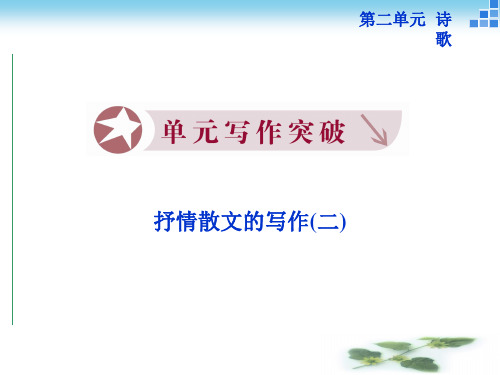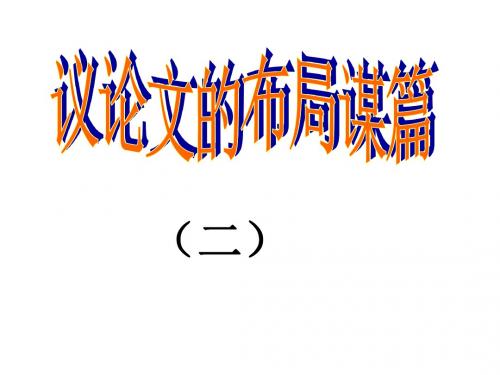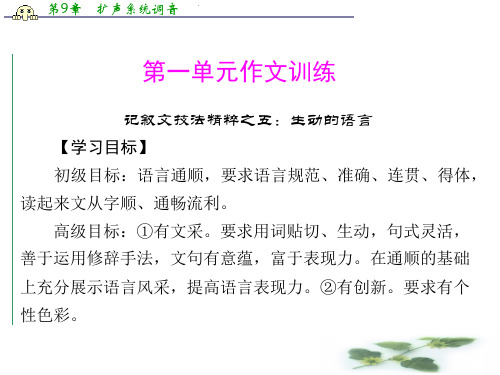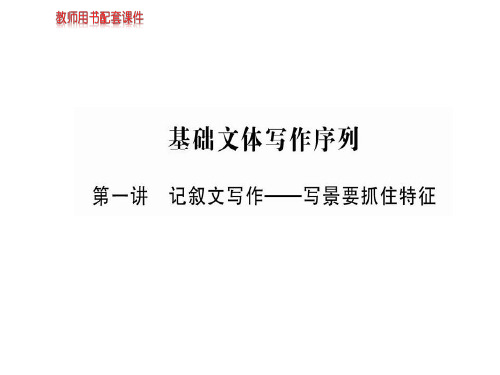高中必修二考前作文指导ppt实用课件
- 格式:ppt
- 大小:324.00 KB
- 文档页数:17






高一英语必修二第四单元作文ppt全文共3篇示例,供读者参考篇1Title: Presentation on Unit 4 of English Book 2 for Grade 10Introduction:Hello everyone, today I will be presenting a PowerPoint on Unit 4 of the English Book 2 for Grade 10. This unit focuses on the theme of "Earthquakes". Let's dive in and explore the content of this unit through this presentation.Content:Slide 1: TitleTitle: Unit 4 - EarthquakesSlide 2: Objectives- Understand the causes and effects of earthquakes- Learn about the different measurement scales for earthquakes- Explore ways to prepare for and respond to earthquakesSlide 3: Causes of Earthquakes- Tectonic plate movements- Volcanic eruptions- Human activities (e.g. mining, reservoir-induced seismicity) Slide 4: Effects of Earthquakes- Ground shaking- Tsunamis- Landslides- Structural damage to buildings and infrastructureSlide 5: Measurement Scales- Richter scale- Moment magnitude scale- Mercalli intensity scaleSlide 6: Preparing for Earthquakes- Create an emergency kit- Develop a family emergency plan- Secure heavy items in your homeSlide 7: Responding to Earthquakes- Drop, Cover, and Hold On- Evacuate if necessary- Check for injuries and damages after the earthquakeSlide 8: Case Studies- The Great East Japan Earthquake (2011)- The Haiti Earthquake (2010)Slide 9: Quiz- Test your knowledge on earthquakes with a fun quizSlide 10: Conclusion- Recap of key points from the presentation- Encourage further learning and research on earthquakesConclusion:In conclusion, earthquakes are natural disasters that can have devastating effects on people and the environment. It is important to be prepared and know how to respond in case of an earthquake. I hope this presentation has provided you with valuable information on this topic. Thank you for your attention.References:- English Book 2 for Grade 10- Internet sources on earthquakes篇2High School English Class Two Unit Four Writing PPTSlide 1: Introduction- Title: Exploring the World of Poetry- Welcome to our presentation on Unit Four- Topic: Understanding different forms of poetrySlide 2:What is Poetry?- Poetry is a form of writing that uses language and words in a creative and imaginative way.- It can express emotions, thoughts, and ideas in a unique and artistic manner.- Poetry can be written in various forms such as sonnets, haikus, and free verse.- In this unit, we will explore different types of poems and how they are structured.Slide 3:Types of Poetry- Sonnet: A 14-line poem with a specific rhyme scheme and rhythm.- Haiku: A three-line poem with a 5-7-5 syllable pattern.- Free Verse: Poem that does not follow a specific rhyme scheme or rhythm.- Ballad: A narrative poem that tells a story in a simple and musical way.Slide 4:Writing a Sonnet- Sonnets are often written in iambic pentameter.- There are two main types of sonnets: Petrarchan and Shakespearean.- Petrarchan sonnets have an ABBAABBACDCDCD rhyme scheme.- Shakespearean sonnets have an ABABCDCDEFEFGG rhyme scheme.- Practice writing your own sonnet using one of these structures.Slide 5:Writing a Haiku- Haikus are traditionally Japanese poems that focus on nature and emotions.- They have a 5-7-5 syllable pattern.- Try writing a haiku about a moment in nature that inspires you.Slide 6:Writing Free Verse- Free verse is a more modern form of poetry that does not follow traditional rules.- It allows the poet to express themselves freely without restrictions.- Experiment with writing your own free verse poem on a topic of your choice.Slide 7:Writing a Ballad- Ballads are often sung or recited and tell a story in a simple and rhythmic way.- They typically have a rhyming pattern and refrain.- Create a ballad about a historical event or a personal experience that you find inspiring.Slide 8:Conclusion- Poetry is a versatile and expressive form of writing that allows for creativity and imagination.- By exploring different types of poetry, you can enhance your writing skills and discover new ways to express yourself.- Thank you for joining our presentation on Unit Four. Keep writing and exploring the world of poetry![End of Presentation]篇3Title: Presentation on Unit Four of English Book 2 for Senior High School StudentsGood morning, everyone. Today, I am going to give a presentation on Unit Four of our English book for senior highschool students. This unit focuses on the theme of globalization and its impact on individuals and societies.Firstly, we will start by discussing the definition of globalization. Globalization refers to the process of increased interconnectedness and interdependence among countries, economies, cultures, and individuals. This interconnectedness is facilitated by advances in technology, transportation, and communication.In this unit, we will explore how globalization has affected various aspects of our lives, such as economy, culture, environment, and technology. We will also discuss the advantages and disadvantages of globalization, as well as the challenges it poses to individuals and societies.One of the key topics in this unit is the impact of globalization on the economy. Globalization has led to the growth of international trade and investment, resulting in increased economic opportunities and job creation. However, it has also led to economic inequality, as wealth is concentrated in the hands of a few individuals and corporations.Another important aspect of globalization is its impact on culture. The increasing interconnectedness of the world has contributed to the spread of ideas, values, and traditions acrossborders. This has led to cultural homogenization in some cases, as local cultures are overshadowed by dominant global cultures.Furthermore, globalization has also had a significant impact on the environment. The expansion of trade and transportation networks has led to increased carbon emissions and pollution, contributing to climate change and environmental degradation. It is important for us to consider the environmental consequences of our actions and explore sustainable solutions.Lastly, we will discuss the role of technology in driving globalization. Advances in technology have revolutionized communication and connectivity, making it easier for people to interact and collaborate across distances. Technology has also enabled the rise of digital economies and social media platforms, transforming the way we work, learn, and socialize.In conclusion, globalization is a complex and multifaceted process that has both positive and negative implications for individuals and societies. It is important for us to critically evaluate the impact of globalization on our lives and consider how we can adapt to and navigate its challenges. Thank you for listening to my presentation.。